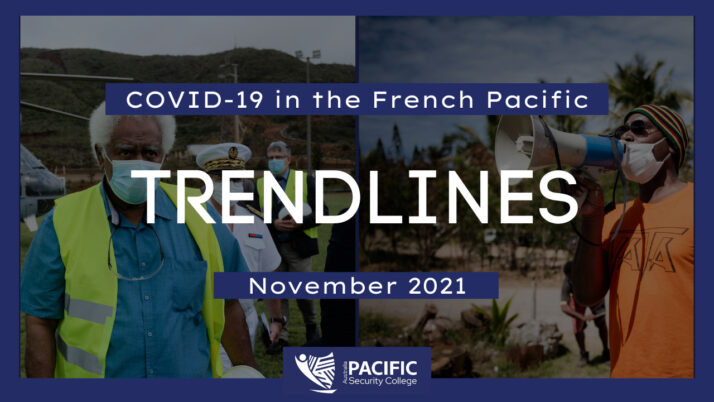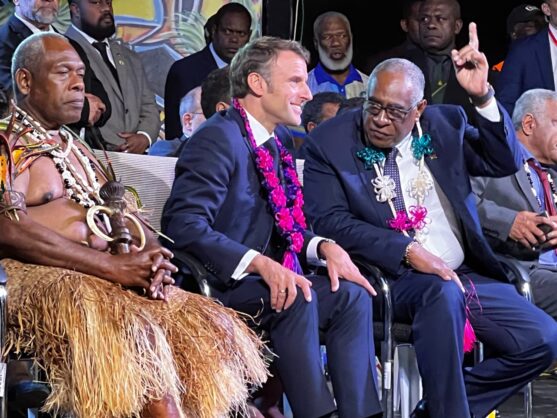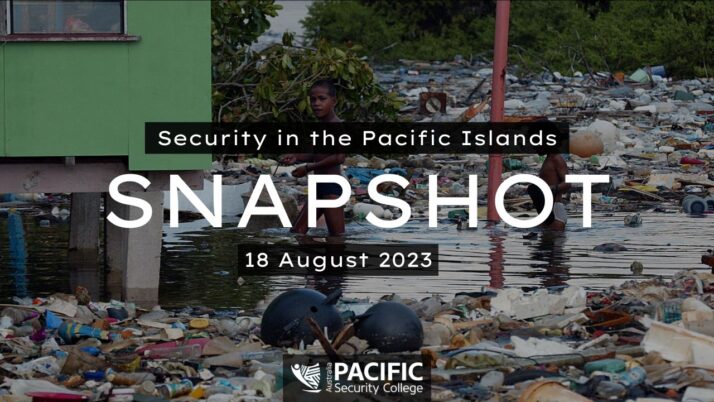COVID-19 Trendlines: French Pacific Territories

Trendlines
- Swift border closure key to success in 2020, border re-opening led to increase in cases
- Decisions made in Paris have impacted Covid case numbers in the French Pacific and angered some indigenous citizens there.
- Vaccination is key to economic and social recovery, but has been hampered by protests, hesitancy and misinformation.
COVID-19 reached the shores of the Pacific Islands region on 11 March 2020. The first case in the Pacific was detected in French Polynesia, when a local politician tested positive upon their return from France. This first case foreshadowed the contours which have characterised the pandemic in the French Pacific territories of French Polynesia, New Caledonia, and Wallis and Futuna ever since: outbreaks resulting from border policies have remained the cause of most infections.
In the 18 months since the first case, the three French Pacific territories have on a per capita basis recorded some of the highest rates of COVID-19 in the Pacific Islands, with 16,199 cases per 100,000 people in French Polynesia, 3,696 per 100,000 people in New Caledonia and 4,036 per 100,000 people in Wallis and Futuna. These rates compare with 10,616 per 100,000 people in mainland France.
An effective early response unravels
Similar to the rest of the Pacific islands region, borders were initially sealed in the first weeks of the pandemic. Only a small number of cases were recorded in the early months of the global pandemic, with border quarantine required for incoming passengers.
An effective lockdown and border closure contained French Polynesia’s first outbreak to just 62 cases and eliminated COVID-19 from the territory by May 2020. Despite some opposition from local Tahitians and unions, French Polynesia’s border was reopened, to quarantine-free travel in mid-July 2020, with 7,500 tourists arriving in the first month. Tourists arrived predominantly from France and the United States, and cumulative COVID-19 cases rose from 62 to more than 17,000 by the end of the year, with around 120 deaths recorded.
At the time, the virus propagation rate in French Polynesia was the highest in the world outside Europe. The border was not closed to tourists until February 2021, at which time case numbers plateaued, likely assisted by the commencement of the vaccination drive. Despite the significant case toll, French Polynesian President Fritch said it would have been irresponsible to keep borders closed and allow businesses to die, stating that the country was “COVID-prepared” when borders opened.
Quarantine-free travel to French Polynesia recommenced for vaccinated travellers from May 2021. Cumulative case numbers and deaths have subsequently doubled, with the delta variant spreading rapidly amongst the unvaccinated population. Officials stopped announcing COVID-19 case numbers in August 2021, at which time more than 40,000 cases had been recorded. Records from French Polynesia’s hospitals show that COVID-19 related deaths continue, while hospitals are at capacity.
A number of cases were identified in border quarantine in Wallis and Futuna during 2020, often related to travellers arriving from mainland France. However, a strict border policy meant the first case of community transmission was not recorded until 9 March 2021. In the weeks following, Wallis and Futuna’s tally reached 454 cases as well as seven deaths.
New Caledonia’s cases were contained to a trickle through most of 2020 and 2021, with no community transmission for large periods of time, and no deaths recorded. Three unrelated delta-strain cases were identified in September 2021. Since then, more than 10,000 cases have been recorded as well as 261 deaths.
Relationships with France in the spotlight
The COVID-19 pandemic has presented governments across the world with an unprecedented human security challenge. Whole of nation responses have been required to respond to the pandemic, which has demanded new and innovative partnerships. Local governments in the French Pacific territories have been no different, while the relationship between the territories and metropolitan France has also faced new challenges.
Protests and instability have been a frequent characteristic of the policymaking environment during the pandemic in the French Pacific territories, with protests particularly common in Noumea and Papeete. In 2020, protests at airports in New Caledonia were frequent, with locals demanding tighter restrictions. They were angry that French officials continued to enter the territory for regular rotations, bypassing customs and health checkpoints, despite 21-day mandatory quarantine restrictions.
Daniel Goa, president of the pro-independence Caledonian Union accused the French High Commissioner of failing to respect the Noumea Accord, and asked him and the commander of the French military to leave the territory. Pro-independence parties challenged the decisions made by the French High Commission in the French Constitutional Court, stating they violated the Noumea Accord, which transferred healthcare to the local government.
Traditional leaders have pleaded for a more cautious approach to managing the pandemic, than the French. Traditional leaders including chiefs in Wallis and Futuna appealed in 2020 for tighter prevention measures to prevent the virus’ spread.
Despite demonstrations, there have been significant flows of French assistance to the three territories throughout the pandemic. In the wake of New Caledonia’s delta outbreak, the French Overseas Minister, Sebastien Lecornu promised “long-term” medical and financial assistance to New Caledonia. The New Caledonia government requested the French army assist with the outbreak, suggesting the military could establish ten intensive care units at the Noumea hospital. Similarly, while Lecornu was visiting French Polynesia in August, officials from the territory’s main hospital appealed to French President Emmanuel Macron to send more medical personnel to assist with the outbreak. France sent 72 healthcare professionals to Wallis and Futuna to help manage the outbreak in the first half of 2021.
An “air-bridge” was established to transport patients to France, after more than 1,300 people were admitted to the Noumea hospital during the first month of the outbreak. Individuals have also been flown from French Polynesia to Paris. Journalist Nic McLellan has compared the Covid response in the French Pacific with other Pacific nations.
Vaccination and pathways forward
The French Pacific territories are heavily reliant on travel, including between the territories, with France, and across the Pacific Islands region. As such, the imperative to open borders has been particularly strong in this part of the Pacific.
New Caledonia and French Polynesia are heavily reliant on tourism. Tourism is the main economic driver in French Polynesia, where it is estimated that the pandemic wiped USD 1.2 billion from the territory’s economy in 2020 alone, while 900 jobs were lost in New Caledonia. There have been hopes of a travel bubble between New Caledonia, Australia and New Zealand. French Polynesian officials desperate to re-start tourism flows have come under scrutiny for their willingness to reopen borders to French and American tourists at numerous points in the pandemic.
Vaccination has been viewed by leaders as a key pathway to economic growth and safe tourist travel. However, vaccination politics have been particularly polarising. New Caledonia’s congress voted unanimously to make vaccination compulsory for medical personnel as well as airport and port workers. This came ahead of New Caledonia’s delta-strain outbreak. Crowds rallied against the ruling.
Similar legislation to make vaccination mandatory for healthcare staff and other public-facing workers is now scheduled to come into effect in French Polynesia in December, despite significant opposition. Widespread rallies against mandatory vaccination for healthcare and frontline staff attracted more than 500 people in Papeete. Within parliamentary ranks, the debate to mandate vaccination in French Polynesia has been fierce. Two of the governing Tapurra Huiraatira party’s most senior members refused to comply with laws making vaccinations mandatory.
Vaccine misinformation has been a major hurdle, particularly in Wallis and Futuna. 18,000 vaccine doses were rushed from France to Wallis and Futuna at the time of the March outbreak, with a significant uptake of the vaccine within the first month. However, after the acute outbreak ended, vaccine misinformation on social media was attributed as driving plateauing levels of vaccination in the territory. Wallis and Futuna announced it would return many of its vaccines due to pervasive vaccine hesitancy.
Looking to 2022
With New Caledonia headed to the polls on 12 December 2021 for its third and final referendum as part of the Noumea Accord, its experience with the still ongoing delta-strain outbreak will no doubt loom large in voters’ minds. France has stepped up security in the territory to an unprecedented extent. The pro-independence FLNKS has called for the referendum to be postponed to allow for all focus to be on the COVID response, and to recognise the many Kanak people who are presently in mourning. France is still pushing ahead.
Experts believe case numbers in New Caledonia and French Polynesia have now reached their peak, while Wallis and Futuna has not recorded a COVID-19 case since May 2021. With vaccination rates increasing above rates recorded in some other parts of the region, such as Vanuatu and Tonga, locals are looking to a brighter 2022.
More Stories

Blog - 24 Aug 2023
The Islands Blocking Vanuatu-France Relations
President Macron promises to resolve a territorial dispute with Vanuatu, writes Ben Bohane in Port Vila. When French President Emmanuel Macron appeared at the Melanesian Arts Festival in Vanuatu recently, he received a rousing welcome from the crowd by speaking in the three official languages of Vanuatu: Bislama, French and English. “Let me tell you…

Security Snapshot - 18 Aug 2023
Pacific Security Snapshot | 18 August 2023
The security stories shaping the region ➣ Pacific Resilience Facility endorsed at the Forum Economic Ministers Meeting ➣ The Pacific Climate Security Assessment Guide ➣ French President Macron visits Papua New Guinea and Vanuatu ➣ US Secretary of State and Secretary of Defence in the Pacific ➣ Bougainville eruption leaves 8,000 displaced Climate Security Ministers…






